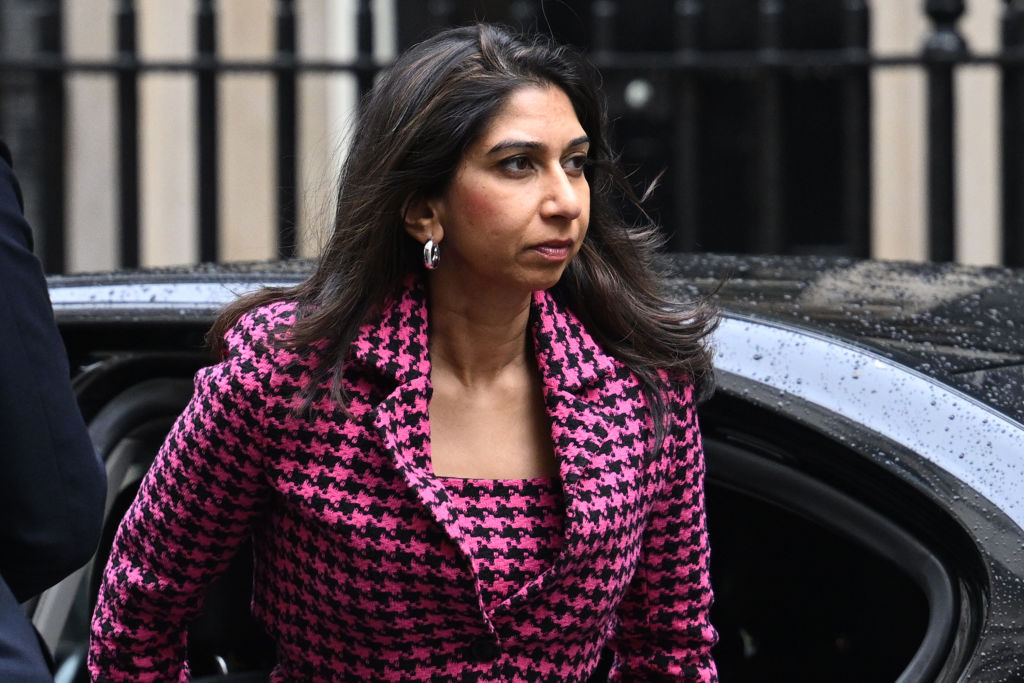It hardly takes a genius to work out that whoever is in charge of the government’s media grid over the summer parliamentary recess has designated this as ‘illegals week’. Not only has Home Office floated the eye-catching idea of building a holding centre on Ascension Island, but the Bibby Stockholm has finally seen its first residents march up the gang plank. Yet another new crackdown on employers hiring illegal immigrant staff has been heralded by the Prime Minister, while Tory deputy chairman Lee Anderson has suggested that migrants who turn their noses up at being housed on barges should ‘f*** off back to France’. And it’s only Wednesday.
After half a year of failing to stop the boats, Sunak’s administration is determined at least to be seen to ‘strain every sinew’. It hopes that voters will conclude that it is at least trying.
Most of these postures – for they are hardly solid policies – have attracted gratifyingly large amounts of pushback from the hated metropolitan left. And clearly there is more to come. Much more. Today’s talking point concerns the manufacture and distribution of the dinghies used to take migrants across the Channel, or at least across to the halfway line from where the government’s fabulous water taxi service picks them up and brings them into Dover. The idea is that if ministers can prevent so many of these bodged-up inflatable craft being available to purchase in northern France then the size of the flotilla will naturally dwindle.
Home secretary Suella Braverman has ‘launched a crackdown on migrant trafficking gangs in Turkey’, a country that is said to be the source of up to 90 per cent of the inflatables used by the people traffickers. According to the Telegraph, a new centre funded to the tune of £3 million by the British taxpayer is being set up by police in Turkey ‘to help coordinate joint operations to cut off the supply of boats and boost intelligence sharing’. The increasing volume of Turkish nationals crossing the Channel illegally is also to be addressed by the new partnership. Mrs Braverman tells the paper: ‘We must do everything we can to smash the people-smuggling gangs and stop the boats.’
Veteran observers of the regime of Tayyip Erdoğan will recall how he expertly extracted billions of euros from the EU in return for a pledge to stop a flood of migrants crossing into Greece — and therefore may doubt that £3 million in sterling will buy very many raids on backstreet workshops.
But after half a year of failing to stop the boats, Sunak’s administration is determined at least to be seen to ‘strain every sinew’. It hopes that voters will conclude that it is at least trying, and that leftists should be blamed for the obstacles being placed in its way. The problem is that when you have a secure parliamentary majority, advertising the fact that your writ does not run can backfire. Edward Heath found that out the hard way in 1974 when he called an election on the issue of ‘who governs Britain?’. If he needed to ask, voters decided, then clearly it couldn’t be him.
Tory strategists need to handle this issue with great care. On the one hand having the phenomenon of mass illegal immigration high up the news agenda clearly poses big challenges for Labour and other left-wing opposition parties. But on the other it may add to the widespread feeling among Tory-leaning voters that the government is big on talk but hopeless on delivery. Just look to Priti Patel, who found that the initial goodwill of the Tory electorate towards her wore thin after she failed to break the business model of people traffickers and stop the Channel dinghies.
Perhaps because it is August the Tory high-ups are right to conclude that the electorate is not really concentrating and can therefore be palmed off with pleasing gimmickry once more. But the Michael Gove motto for ministers of ‘show, don’t tell’ casts a lengthening shadow over this policy area. It is looking more and more likely that our existing human rights framework, as well as obsolete international accords about asylum-seeking, cannot effectively address the small boats phenomenon. The British electorate may currently have their holiday heads on, but taking them for fools seldom ends happily for governing parties.







Comments